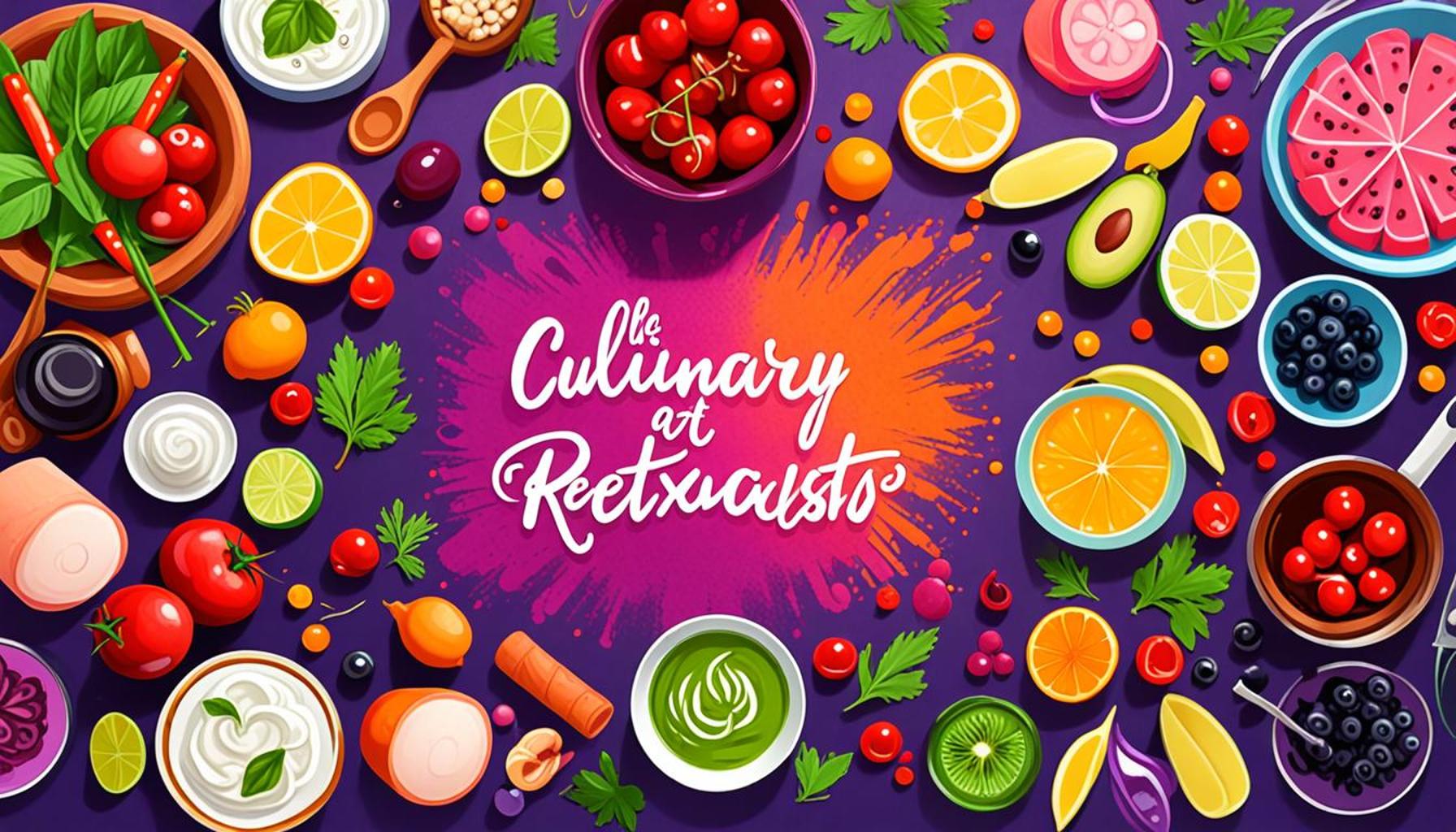Culinary Experiences at Relaxation Retreats: A Taste of Wellness

Exploring Culinary Experiences at Relaxation Retreats
Imagine the sensation of savoring a meal that not only delights your palate but also elevates your spirit. Across the United States, culinary experiences at relaxation retreats are evolving, offering a unique fusion of wellness and gastronomy that deepens your connection with food. These retreats encourage an exploration of mindful eating, enhancing both your physical health and mental clarity.
Locally Sourced Ingredients
One of the standout features of these culinary experiences is the emphasis on locally sourced ingredients. Many retreats prioritize fresh, organic produce sourced directly from nearby farms, allowing guests to enjoy flavors that are both authentic and vibrant. For instance, a retreat in California’s Napa Valley might offer a menu featuring heirloom tomatoes, artisanal cheeses, and wines produced by local vineyards. This not only supports sustainable farming practices but also allows guests to experience the true essence of regional cuisine.
Mindful Eating Practices
The practice of mindful eating is central to the culinary journeys at these retreats. Guests are encouraged to slow down and be present during meals, turning dining into a meditative experience. This practice promotes awareness of hunger and fullness cues while enhancing appreciation for the flavors, textures, and aromas of the food. Workshops often include techniques such as breathing exercises before a meal or guided reflections on how the food impacts one’s body and mind, providing a holistic approach to nourishment.
Diverse Culinary Traditions
The culinary offerings at these retreats are as diverse as the guests themselves. Expect to be treated to a wide array of diverse culinary traditions. From Mediterranean-inspired dishes rich in healthy fats and fresh vegetables to mouthwatering Asian flavors that incorporate a wealth of spices and herbs, each meal tells a story. For example, a wellness retreat in Sedona, Arizona, may offer an Asian fusion dinner featuring sushi rolls made with locally cultivated quinoa, reflecting both innovation in culinary arts and a commitment to healthfulness.
A Vital Role in Wellness Journeys
Engaging in these culinary adventures not only enhances the enjoyment of food but also plays a vital role in your overall wellness journey. Chefs at these retreats craft menus tailored to support various health goals—be it weight loss, detoxification, or balanced nutrition—ensuring that every meal feels both indulgent and restorative. Each dish is created with intention, reflecting a balance of flavors and nutrients designed to rejuvenate the body and nourish the mind.
As you delve deeper into the world of culinary experiences at relaxation retreats, prepare to uncover a symphony of flavors intertwined with holistic practices. Whether you are looking to unwind, replenish your spirit, or discover new gastronomic delights, these unique venues promise to transform your understanding of food and wellness. Your taste buds and your mind are about to embark on a joyful journey of rejuvenation and discovery that will resonate well after the retreat concludes.
DISCOVER MORE: Click here to delve deeper
The Healing Power of Food
Culinary experiences at relaxation retreats do more than satisfy hunger; they serve as a healing pathway that reconnects individuals with their bodies and minds through the art of eating. Each meal is curated with an intention that aligns with the overall philosophy of wellness that these retreats embody. Chefs often collaborate with nutritionists to design menus that are not only delicious but also rich in nutrients essential for healing and vitality.
At these retreats, food becomes a medium for healing through a variety of transformative approaches. For example:
- Farm-to-Table Dining: Encouraging transparency and sustainability, food is often sourced from local farms. This practice not only benefits the community but provides guests with food that is fresh and free from harmful additives.
- Customized Meal Plans: Many retreats offer personalized meal plans designed to address specific health concerns, from digestive issues to energy enhancement. This tailored approach ensures that each guest receives food that nourishes their unique body requirements.
- Culinary Workshops: Interactive cooking classes allow participants to learn about nutritional value, preparation techniques, and the benefits of different ingredients. These workshops also foster a communal atmosphere where guests can share stories and connect through food.
Seasonality and Sustainability
Another appealing aspect of culinary experiences at relaxation retreats is the focus on seasonality and sustainability. Retreats often highlight the importance of using ingredients that are in season to promote the freshest and most flavorful dishes. Seasonal eating not only supports local agriculture but also encourages guests to appreciate the cyclical nature of food availability. A vibrant summer salad, abundant with cucumbers, peppers, and ripe berries, contrasts sharply with the hearty root vegetable stews enjoyed in winter. This practice brings awareness to the seasons, fostering a deeper connection to the cycle of life and time.
Additionally, sustainability efforts are typically woven into the fabric of the retreat’s culinary experiences. Many facilities implement eco-friendly practices, such as composting kitchen scraps, reducing food waste, and utilizing renewable resources. Such initiatives resonate well with guests who are conscious of their ecological impact and seek to indulge in a culinary experience that aligns with their values.
A Journey Beyond the Plate
The culinary journey at relaxation retreats goes beyond mere sustenance; it is about creating an atmosphere where meals transform into enriching experiences. Through the amalgamation of mindful eating, creative preparations, and a profound respect for locally sourced ingredients, guests have the opportunity to embark on an enlightening, sensory journey. As they savor each bite, they are reminded to cherish not just the food on their plates, but also the present moment, embracing the entirety of their wellness journey.
As the exploration of culinary experiences continues, each retreat promises an invitation to cultivate a deeper understanding of nourishment, making it an integral aspect of personal wellness. Whether you find yourself at a coastal hideaway or a mountain sanctuary, the food encountered will certainly play a significant role in fostering a sense of mindfulness, connection, and joy. This holistic approach to dining captivates not only the taste buds but also rejuvenates the spirit.
| Advantages | Description |
|---|---|
| Holistic Wellness | Culinary experiences at relaxation retreats promote a holistic approach to health, combining nourishment and mindfulness for overall wellbeing. |
| Connection with Nature | Participating in farm-to-table dining encourages a deeper connection with the ingredients, enhancing appreciation for sustainability and local agriculture. |
| Culinary Education | Workshops on cooking and nutrition empower guests with skills and knowledge to maintain healthy eating habits long after their retreat ends. |
| Social Connections | Sharing meals creates lasting bonds among guests, enhancing the overall experience through community and shared culinary journeys. |
Exploring these aspects reveals the multi-dimensional benefits of culinary experiences integrated within relaxation retreats, encouraging individuals to nourish not just their bodies, but their spirits and minds as well. The trend surrounding wellness through cuisine is growing, captivating those seeking more than just a vacation; they desire a transformative journey toward overall health.
DISCOVER MORE: Click here to ignite your romance
The Role of Mindfulness in Dining
At relaxation retreats, the culinary experience is designed to foster mindfulness, reinforcing the connection between food and mental well-being. Each meal becomes a ritual that encourages participants to engage all their senses. The emphasis shifts from hurried consumption to a more deliberate and appreciative approach to eating. Guests are often invited to practice mindfulness techniques, such as deep breathing or silent reflection, before and during meals. This helps individuals become present in the moment, allowing them to fully experience the flavors, textures, and aromas of their food.
Some retreats incorporate meditative dining experiences, where meals are served in serene environments, often accompanied by calming background music or natural sounds. Guests are encouraged to savor each bite, recognizing the journey of each ingredient from the farm to the table. This mindfulness not only enhances enjoyment but can also lead to improved digestion and greater satisfaction—a concept referred to as “conscious eating.” Scientific studies suggest that mindful eating can help combat emotional eating and promote healthier food choices, making it a powerful tool in the pursuit of wellness.
Culinary Traditions from Around the World
Another enriching aspect of culinary experiences at relaxation retreats is the opportunity to explore global culinary traditions. Many retreats draw inspiration from diverse cuisines, showcasing techniques and recipes that highlight the health benefits of various cultural dishes. For instance, the Mediterranean diet, known for its emphasis on whole grains, fresh fruits, vegetables, and healthy fats, is often featured for its numerous health benefits, including heart health and longevity.
Additionally, the fusion of traditional wellness concepts with modern culinary practices is becoming increasingly popular. For example, Ayurvedic cooking, which incorporates the principles of balance and harmony, may be practiced at various retreats. Meals are prepared according to an individual’s dosha, or unique constitution, helping guests to function optimally while enjoying delicious and satisfying food. The inclusion of these rich cultural practices not only offers guests delectable meals but also broadens their culinary horizons, enhancing their appreciation for food as a global unifier.
The Impact of Community and Connection
Beyond the individual experience, the culinary offerings at relaxation retreats also foster a sense of community and connection. Group dining settings provide an inviting atmosphere for guests to bond over shared meals, breaking bread together. This communal aspect is especially pivotal as it often facilitates discussions about health, wellness, and personal journeys, forging new relationships among participants.
Many retreats organize themed dinners where guests can participate in potluck-style meals or showcase their culinary skills, further enhancing the sense of camaraderie. These gatherings provide an opportunity for individuals to share recipes, cooking tips, and personal stories related to food. This shared experience can amplify the overall sense of belonging and connection, making the culinary journey at retreats a memorable and enriching aspect of their wellness experience. The collective enjoyment of good food promotes feelings of happiness and inclusion, leading to an overall uplift in mood and mental outlook.
DISCOVER MORE: Click here to uncover family-friendly adventures
Conclusion: Savoring Wellness Through Culinary Journeys
In an age where well-being is increasingly prioritized, culinary experiences at relaxation retreats emerge as a vital component of holistic wellness. By integrating aspects of mindfulness, cultural diversity in culinary practices, and a sense of community, these retreats not only nourish the body but also refresh the spirit. The practice of thoughtful eating, where meals are treated as a sensory journey, creates an essential link between food and mental health, allowing individuals to cultivate a deeper appreciation for every bite.
The exploration of global culinary traditions enriches the overall experience, affording guests the opportunity to embrace health benefits from various diets, like the Mediterranean or Ayurvedic practices. These traditions showcase a world of flavors and methods that promote health while fostering creativity in the kitchen. Such culinary adventures offer more than just meals; they educate and inspire participants to carry these principles of health and connection beyond their retreat experience.
Equally important is the communal aspect of shared dining experiences, which enhances relationships and nurtures a sense of belonging among guests. This social dimension proves invaluable, as breaking bread together encourages conversation about wellness journeys and personal growth. As retreats continue to blend culinary delights with wellness practices, they reaffirm the importance of food not just as sustenance, but as a profound source of joy, connection, and healing.
Ultimately, embarking on a culinary journey at a relaxation retreat is about far more than just taste; it is about savoring life itself, fostering connections, and nourishing a path to holistic well-being.


